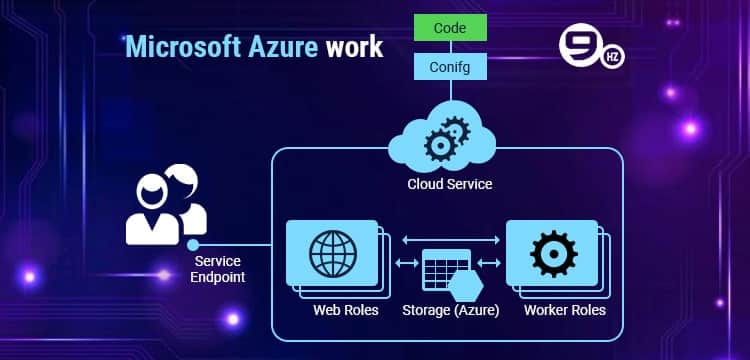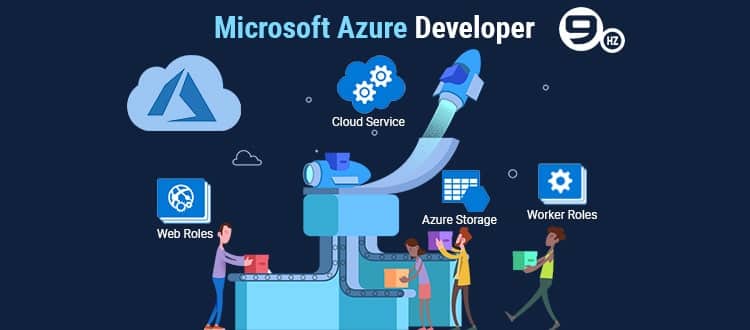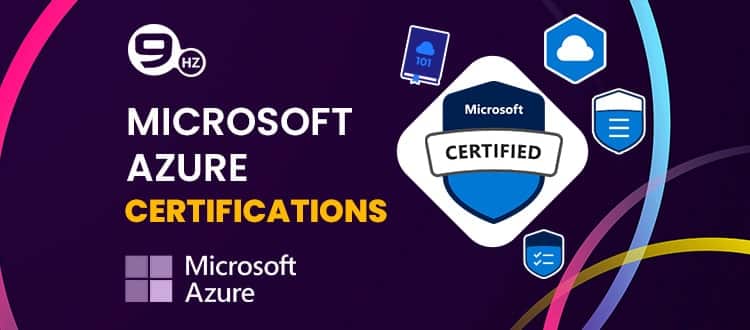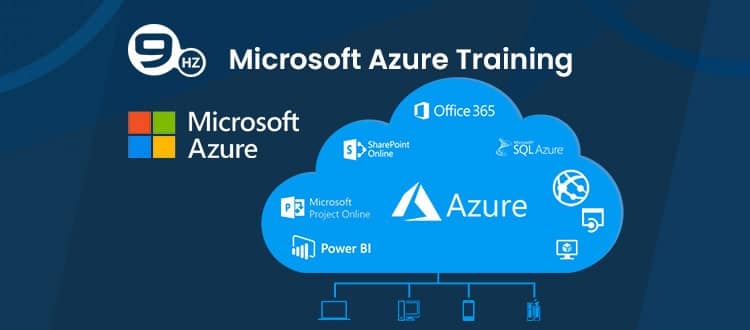As far as cloud computing platforms go, Microsoft Azure is undeniably one of the most widely used. With Microsoft’s market cap of 2021 standing at 1.97tn USD, and with 22% of Azure cloud infrastructure services market share during Q2 of 2021 (both figures as per Statista), Microsoft Azure is at present one of the leading contenders of cloud computing platforms used around the globe. In fact, according to Statista, about 44% of global organizations were running significant workloads on Azure in 2020 alone.
This takes us to the ever-growing demands of Microsoft Azure experts across global enterprises. With an increasing number of organizations looking for employees with experience in Microsoft Azure and Microsoft cloud services, being professionally qualified & certified as an Azure developer will be a significant advantage and enlarge the scope of employment.
To make things a little bit easier, here we have compiled everything you need to know about Microsoft Azure, including its basics, professional certifications, the certification exam, and related training.
What is Microsoft Azure? Microsoft Azure Basics
Microsoft Azure is Microsoft’s cloud computing platform. Formerly known as the Windows Azure, it is now the most well-known platform from Microsoft cloud services and offers an extensive range of capabilities, including cloud computing, analytics, storage, and networking. Organizations can choose any of these services to develop new applications or run the existing ones in the public cloud.
Operationally, Microsoft Azure enables enterprises to mitigate challenges while simultaneously meeting their organizational end goals. Designed to support all industries and compatible with open source technologies, the well-equipped tools offered by Azure provide its users with a certain level of flexibility that allows them to leverage Microsoft cloud services for their specific requirements.
Four different types of cloud computing options are offered by Microsoft Azure, such as Infrastructure as a Service (IaaS), Platform as a Service (PaaS), software as a Service (SaaS), and serverless. The way Microsoft Azure works and how it is used can be gleaned in detail from the following paragraphs.
How Does Microsoft Azure Work?

The basic workflow of Microsoft Azure is pretty much simple and easy to understand. Once a user has subscribed to Microsoft Azure, they gain full access to all the services within the platform and can utilize them to create databases or any other cloud-based resources that they want.
Simultaneously, Microsoft Azure allows users to buy software from third-party vendors that are made available directly through the platform.
When it comes to customer support options, Microsoft Azure provides five: basic, developer, standard, professional direct, and premier. Aside from the Basic, which is available to all Microsoft Azure accounts, all the other customer support plans require a fee. Naturally, these customer support plans vary as per price and scope of support. For instance:
- Microsoft Azure charges $29 per month for Developer support
- $100 per month for Standard support
- $1000 per month for Professional Direct support
- The charges for Premier support remain undisclosed.
What is Microsoft Azure Used For?
Microsoft Azure offers an extensive range of service offerings, and as such, its use case is exceptionally diverse. For instance, running virtual machines is one of the most common uses of Microsoft Azure on the one hand, and the platform can be used to support third-party operating systems on the other. However, Microsoft Azure is generally used as a database hosting platform in the cloud. For this, Microsoft cloud services offer serverless relational databases in the shape of Azure SQL and non-relational databases like NoSQL.
Microsoft Azure for DR and Backup
Many organizations use Microsoft Azure for data storage, backup, and disaster recovery purposes. Rather than investing in third-party storage, these organizations prefer to run their business applications in Microsoft Azure, thus consolidating their functions at a single place and using the platform as a convenient alternative for data centers.
As per a Statista report, a total of approximately 15,700 products & services were offered on Microsoft Azure as of mid-2021, among which only 377 were by Microsoft and the rest published by partners.
Microsoft Azure Products & Services
In line with its use cases, Microsoft cloud services pack in Azure products & services across about two dozen categories. This include:
- Compute
- Mobile
- Web
- Storage
- Analytics
- Networking
- Media & content delivery network (CDN)
- Integration
- Identity
- Internet of Things (IoT)
- DevOps
- Development
- Security
- Artificial intelligence and machine learning (AI/ML)
- Containers
- Databases
- Migration
- Management & governance
- Mixed reality
- Blockchain
- Intune
Microsoft Azure Privacy
Privacy always has been and continues to be one of the major concerns for cloud subscribers. Data security concerns and increasing threats keep the organizations perturbed. To mitigate these security & privacy challenges, Microsoft has created their Trust Center, an online forum that addresses privacy & security questions and offers detailed information regarding the company’s consolidated security policies.
Microsoft Azure Pricing
The pricing of Microsoft Azure is based on a pay-as-you-go model, where the users are charged only for the specific services & resources that they use. Microsoft Azure pricing is thus considerably flexible and can be accommodated by enterprises of any size while at the same time being adequately scalable.
Microsoft Azure Significant Outages
Microsoft Azure, however, is not error-free. The platform has undergone multiple major outages, beginning from 2012. Some of the most significant and relevant outages that occurred in Microsoft Azure are mentioned below:
- In February 2012, a disruption was witnessed as a result of the leap day bug.
- In July 2012, an interruption lasting about two & a half hours was experienced in the West Europe region.
- In February 2013, users were unable to access many Microsoft Azure functions, including Storage blobs, tables, and queues across all the Azure regions.
- In October 2013, an outage caused by swapping virtual IP addresses occurred and lasted for nearly 8 hours across the United States, Europe, and Asia.
- In November 2014, issues were faced in storage connectivity as an outage occurred and lasted for about 10 hours.
- In December 2015, several users in Europe were incapable of accessing Office 365 for about 4 hours.
- In September 2016, a DNS issue caused an outage for several hours.
- In March 2017, a worldwide outage for 7 hours was caused by a problem that occurred in one of Microsoft’s data centres.
- In June 2018, lightning strikes in the US caused outages in 10 regions.
- In May 2019, a DNS outage made Azure services unavailable for hours.
Microsoft Azure Competition
As mentioned earlier, Microsoft Azure is one of the leading public cloud service providers that operate on a global scale and is a major competitor of Amazon Web Services (AWS) and Google Cloud. Nevertheless, according to a Statista survey conducted in February 2021, about 67% of 819 global respondents stated that they relied on Microsoft Azure for their cloud services. The steady growth of Microsoft Azure despite its competition is quite evident from another report by Statista. According to this survey, Microsoft Azure’s revenue grew 51% in the second quarter of 2021 when compared to the same time span of last year.
Not only that, according to the 2021 Flexera State of Tech Report, a significant increase can be noted among respondents in expected vendor spend as about 19% of global enterprises are likely to invest more in Microsoft Azure, thus putting it in the leading position in 2021.
The competitive global position of Microsoft Azure against that of AWS and Google is further strengthened by the increasing number of Azure regions – now expanded into 60 regions across the globe.
Also Read: 40+ Best App Ideas For Startups, Beginners, College Students
Microsoft Azure History
Microsoft had initially unveiled its plan to launch a cloud computing service back in 2008. At that time, it was named Windows Azure. Preview versions were introduced and developed, and the service was not commercially launched until 2010. In its beginning stage, Microsoft Azure fell far behind the competitive standard of established cloud services. However, the service continued to advance and underwent a continuous development that extended its support to a larger number of programming languages, frameworks, and operating systems. As it steadily developed, Microsoft recognized the scope & potential of cloud computing and moved it far beyond the limits of Windows, and re-launched the new generation of Azure as Microsoft Azure in 2014 and under Microsoft cloud services.
How to Become a Microsoft Azure Developer?

Now that you have gleaned a comprehensive understanding of the basics of Microsoft Azure, it is time to take a look at what you might need to become a Microsoft Azure developer. First & foremost, being a Microsoft certified Microsoft Azure developer requires a specific qualification. This qualification can be achieved through the Microsoft Azure Certification that Microsoft offers for some targeted job roles. The examination associated with this certification is called the Microsoft Azure Fundamental. In the following paragraphs, we will discuss in detail the Microsoft Azure Certification, the Microsoft Azure Fundamentals, and Microsoft Azure training essential for exam preparation.
Microsoft Azure Certifications

Microsoft Azure Certification Overview
The Microsoft Azure Certifications is designed to measure the candidate’s foundational knowledge of cloud services as well as the level of their knowledge regarding these services in conjunction with Microsoft Azure. Specifically intended for professionals who are just beginners in the domain of cloud-based solutions or services, the Microsoft Azure certification is the best qualifying and the most credible certification for individuals who are new to Azure.
This certification provides an opportunity to aspiring professionals to prove their depth of knowledge regarding cloud concepts and the level of experience in Azure services, workloads, security, and privacy in Azure, as well as Azure pricing and support.
As a result, candidates who are aspiring to become certified Microsoft Azure developers and/or cloud service experts should be thoroughly acquainted with the concepts related to general technology, including but not limited to the concepts of networking, compute, storage, application support, and application development.
While having Microsoft Azure Certification can prove to be a credible addition to your CV when applying for other Azure role-based or specialty domains, it is not a prerequisite.
Microsoft Azure Developers Job Roles
- Microsoft Azure developer, administrator, business user, technology manager
- Required exam for Microsoft Azure certification
- Microsoft Azure Fundamentals AZ-900 Exam
Skills Measured Through The Microsoft Azure Certification
As mentioned above, the Microsoft Azure certification evaluates a candidate’s depth of knowledge in cloud concepts as well as experiences in Azure services. To be more precise, the Microsoft Azure certification measures your skills & knowledge in:
- Cloud concepts
- Core Azure services
- Core solutions and management tools on Azure
- General security and network security features of Azure
- Identity, governance, privacy, and compliance features
- Azure cost management and Service Level Agreements (SLAs)
Microsoft Azure Fundamentals
Microsoft Azure Fundamentals Exam AZ-900 Overview
The Microsoft Azure Fundamentals AZ-900 exam is the qualifying exam for the Microsoft Azure Certification. This means that in order to become a certified Microsoft Azure developer, qualifying for this exam is absolutely necessary.
The AZ-900 exam assesses a candidate on their foundational knowledge on cloud services as well as their knowledge & experience regarding how these services are provided with Microsoft Azure. To put it more simply, it examines your ability and level of skill to describe and implement concepts related to cloud, core Azure services, core solutions, and Azure management tools, general security functions, network security features, privacy and compliance features, Azure cost management, and SLAs, among other things.
Microsoft Azure Fundamentals Exam Languages
The Microsoft Azure Fundamentals exam is available in multiple languages, including English, Japanese, Chinese (Simplified), Korean, Spanish, German, French, Indonesian (Indonesia), Arabic (Saudi Arabia), Chinese (Traditional), Italian, Portuguese (Brazil), Russian
Microsoft Azure Fundamentals Exam Price
$99 USD in the United States. The price can differ based on the country where the exam is conducted.
Skills Measured in the Microsoft Azure Fundamentals Exam
How the Microsoft Azure Fundamentals examines the above-mentioned concepts is categorically given below, along with a percentage for added convenience:
- Cloud concepts (20-25%)
- Core Azure services (15-20%)
- Core solutions and management tools on Azure (10-15%)
- General security and network security features (10-15%)
- Identity, governance, privacy, and compliance features (20-25%)
- Azure cost management and Service Level Agreements (10-15%)
Microsoft Azure Training

The Microsoft Azure Fundamentals AZ-900 exam can feel a tad bit intimidating. But with preparation done the proper way, you can easily achieve the Microsoft Azure Certification.
Just like any other exams, the Microsoft Azure Fundamentals, too, has a specific skill set to measure. As a result, you can easily narrow down your focus area while preparing for this exam. To make things way easier & convenient for aspiring candidates, Microsoft has designed their own Microsoft Azure, training models.
Through these Microsoft Azure training models, Microsoft not only helps candidates to master their knowledge over the related concepts for the Microsoft Azure Fundamentals exam but also allows beginners in the cloud services domain and/or in the Azure services to strengthen their knowledge & experience even though they don’t sit for the Microsoft Azure Certification. Through these training sessions, the beginners or the candidates can prepare for other Azure role-based or specialty certifications as well.
To make the Microsoft Azure training more flexible and all-inclusive, Microsoft offers two different types of training modes, such as online free training and instructor-led paid training. The two types of training models, although both training for the purpose of Microsoft Azure Fundamentals Certification, significantly differ from each other.
Also Read: 40+ Creative Website Ideas for Startups
Free online Microsoft Azure Training
The free online Microsoft Azure training for Fundamentals Certification has 6 lessons divided into a number of modules within each lesson. For instance, while part 1 has 3 modules, part 6 has 2. Targeted for absolute beginners, this 6 part Microsoft Azure training is dedicated to the sections of skills to be examined categorically in the AZ-900 exam, where each part provides comprehensive training of each category of skill.
For better understanding, the entire training plan is given below, along with parts, categories, and several modules:
- Microsoft Azure Fundamentals part 1: Describe core Azure concepts – 3 modules
- Microsoft Azure Fundamentals part 2: Describe core Azure services – 4 modules
- Microsoft Azure Fundamentals part 3: Describe core solutions and management tools on Azure – 6 modules
- Microsoft Azure Fundamentals part 4: Describe general security and network security features – 2 modules
- Microsoft Azure Fundamentals part 5: Describe identity, governance, privacy, and compliance features – 3 modules
- Microsoft Azure Fundamentals part 6: Describe Azure cost management and Service Level Agreements – 2 modules
Instructor-led Paid Microsoft Azure Training
Unlike the offline free Microsoft Azure training, the instructor-led paid training for Microsoft Azure Fundamentals is offered through 2 different types of courses, between which the training methodologies, as well as the targeted audience, considerably differs. A brief description of both the types of courses for instructor-led paid Microsoft Azure training is provided below:
Microsoft Azure Fundamentals (Day 1)
This is a one-day course designed to provide foundational level knowledge related to cloud, core Azure services, core solutions, and Azure management tools, general security functions, network security features, privacy and compliance features, Azure cost management, and SLAs, among other things. This course, however, does not provide a practical hands-on lab experience.
This one-day course for Microsoft Azure Certification is designed to suit the requirements of program managers with a general IT background.
Microsoft Azure Fundamentals (Day 2)
This is a two-day course designed to provide foundational level knowledge related to cloud, core Azure services, core solutions, and Azure management tools, general security functions, network security features, privacy and compliance features, Azure cost management, and SLAs, among other things, just as in the one-day course. Apart from being a day longer than the previous one, this course provides an Azure pass and allows learners to gain hands-on lab experience.
This two-day course with practical experience is designed to suit the requirements of the IT personnel who are just starting to work with Azure.
Take Away: Microsoft Azure Guide
Microsoft Azure, at present, is one of the leading cloud service platforms that is steadily taking over the competition. As a result, Microsoft Azure is bound to open up new possibilities both at organization & operational levels and career-wise. And it is never too late to give your career a boost. So start exploring the opportunities in your career with Microsoft Azure and unlock the potential of both with the Microsoft Azure Certification.
Great Together!
![What is Microsoft Azure? Certifications, Fundamentals, Online Training [Free & Paid Courses]](https://theninehertz.com/wp-content/uploads/2021/09/What-is-Microsoft-Azure.jpg)

![Everything About WordPress Development – [ A Handy Guide ]](https://theninehertz.com/wp-content/uploads/2020/08/How-Much-Does-WordPress-Development-Cost.jpg)






